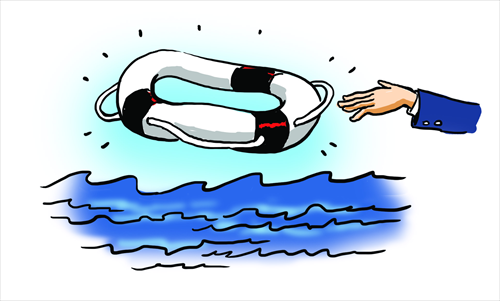HOME >> OP-ED
Philippine aid controversy shows powers jostling for regional dominance
By Guan Yan Source:Global Times Published: 2013-11-19 23:48:01

Illustration: Liu Rui/GT
Haiyan, the strongest typhoon to make landfall in recorded history, has killed over 3,976 people in the Philippines. But from the start, the size of the rescue package sent to Haiyan victims has been seen as a race.
Besides the initial emergency fund of $100,000 and the $100,000 in aid offered by the Red Cross Society of China, the Ministry of Foreign Affairs of China has pledged another 10 million yuan ($1.63 million) of rescue material to Manila on Thursday.
Washington is not shy to promote its rescue efforts to one of its important allies in Southeast Asia, with the aircraft carrier George Washington dispatched and $20 million offered, plus marines and sailors to distribute food and medicine. Japan also sent a high-profile rescue team including warships and 1,180 Self-Defense Forces members. Both countries have extensive experience in disaster relief work.
Rescue effort of Haiyan has particular political concern beside natural sympathy to the victims. Attention to the disaster relief to the typhoon stricken Philippines has reflected the rivalry among major powers for the regional dominant role.
Since Washington's pivot to the Asia-Pacific region in 2011, the South China Sea, among other areas, has witnessed escalating tension.
Alongside China's growing regional influence, Washington has to stress its ability to provide security to its allies to secure its influence in Southeast Asia. It becomes more urgent after President Barack Obama missed two important regional meetings in October and questions were raised about US commitment to its traditional allies.
Though on a humanitarian aid mission, the arrival of aircraft carrier George Washington has a strong symbolic meaning, as it signals US military presence and deployment ability in this strategically important region.
Japan, increasingly isolated in East Asia, is taking rescue efforts to strengthen its diplomacy in Southeast Asia, which Prime Minister Shinzo Abe has emphasized since the beginning of his current term. It is also a way for Japan to demonstrate its status as a regional power.
China's aid to the Philippines was criticized as "meager" and not matching its economic power. In the future, China will face increasing pressure to take more responsibilities in regional affairs.
For both the government and the public, there is a learning curve. Foreign ministry spokesperson Qin Gang remarked on Thursday that China's rescue aid to the Philippines is not a "one-time deal" and will correspond to the post-disaster situation.
Domestically, the Chinese public is tilting against sending rescue aid overseas. An online survey conducted by Sina News, following Chinese government's announcement of further aid, indicated that more than 65.3 percent of the people taking the poll believed the additional aid amount was more than enough, while 9.4 percent thought the figure was less than appropriate.
Some hold that sending aid to foreign countries is premature for a country still plagued by its own development problems. There are also voices opposing political factor affecting humanitarian support.
However, the case with Manila, a staunching ally of Washington's pivot policy, is more complicated not just because of the lasting row over the disputed Huangyan Island.
The Philippine government's incompetent performance in the hostage crisis in 2010 which killed eight Hong Kong tourists, the Aquino administration's stubborn refusal to apologize and failure to deliver proper compensation for that incident, and the Philippine Coast Guard shooting dead a Taiwanese fisherman this May all soured the Chinese public's perception toward their neighbor in the south.
Sending military force for overseas humanitarian aid is still a relatively new mission for China. The security dilemmas sparked by the expanding military footprint is a concern for Chinese authorities.
China's rise will be bound to be a bumpy process, and the controversy surrounding disaster aid to the Philippines attests to that.
The author is a commentator with the Global Times. opinion@globaltimes.com.cn
Posted in: Viewpoint